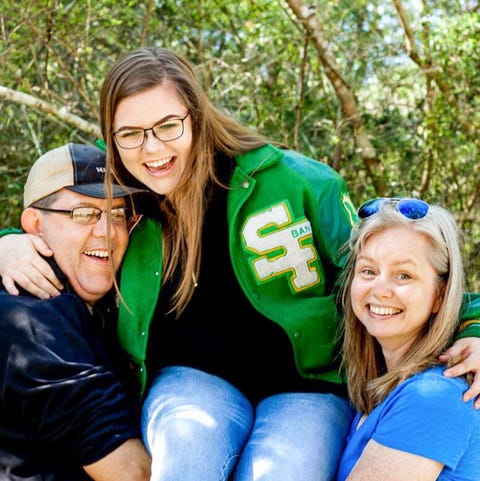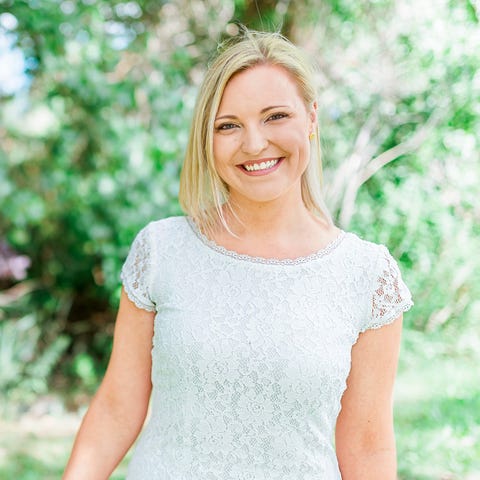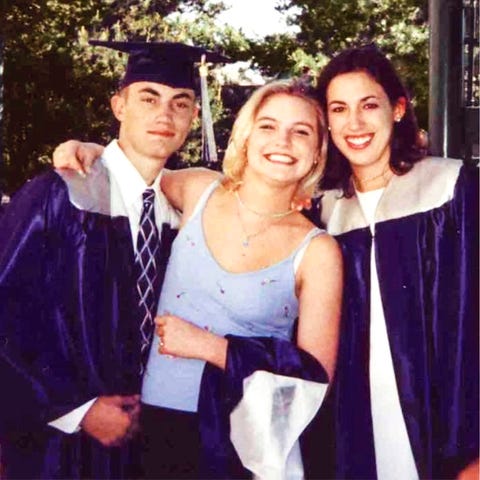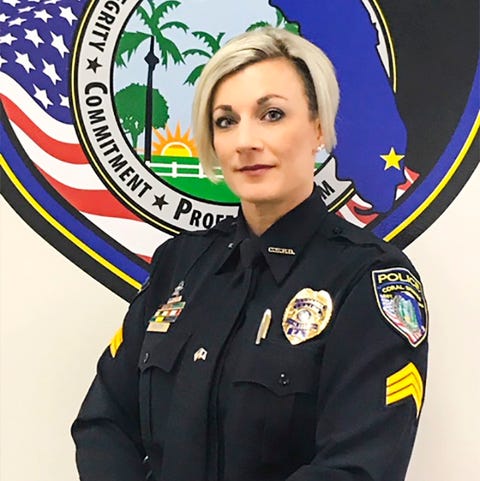How to Get a Gun Safe in the Basement
As the country reels from the recent school shootings and the gun debate rages on, it can feel like we're no closer to finding a solution. But we can all agree on this: Schools should be places of learning, not fear. Three women who lived through Columbine, Parkland, and Santa Fe share simple, powerful ideas on how to save lives.
A Student Survivor
Grace Johnson, Santa Fe, Texas
On may 18, 2018, I woke up at 6:55 a.m. I got up, showered, brushed my teeth, and put on jeans and a T-shirt. I wore Christmas socks because they were the only clean pair I had left. I got in my car at 7:15. I'd been late to school almost every day since January. When senioritis kicks in, it doesn't back down.
Not much was happening in band, my first-period class, and I dozed off. I woke up a few minutes later to a light flashing through the window. The fire alarm had gone off. We have fire drills quite often, so I didn't think much of it, but there was some commotion in the hallway, and I walked toward the noise. That's when I heard screaming. I turned the corner and heard a shot. I saw a body hit the floor. I could see everyone running outside. I ran back to the band hall and hid in an air-conditioning control room with six other people — two adults and four kids. Everyone was freaking out. One girl had her asthma inhaler out. A boy was pacing and biting his nails. I usually stay calm when something traumatic happens. I'm like a mom. I've always been like that.
I said, "Hey, do you all want to pray?" I didn't know if everyone there believed in God, but I figured just holding hands and listening to a calm voice might comfort them. I prayed for our other classmates and for whoever was shooting, that maybe something in their heart would change and they would stop. After that, everyone was pretty calm.

JACK THOMPSON
About an hour later, the police arrived and told us to file out with our hands above our heads and eyes straight ahead. As soon as I stepped out of the band hall, I saw pools of blood. I accidentally stepped in one, and when I saw my red footprints, I started crying. As we walked out, a student grabbed my hand and said, "I want my mom." I said, "I know, it's gonna be okay." I wanted my mom too.
In the weeks after the shooting, a few other students and I met with Texas Senator Ted Cruz and Governor Greg Abbott to talk about school safety. To be honest, some schools aren't as vigilant about protecting students as they should be — the guidelines already in place aren't being followed.
I think random bag checks at school are important to make sure students don't have weapons. Exit-only doors shouldn't have handles on the outside, and they shouldn't be left unlocked. Metal detectors are good in theory, but think about how long it takes to go through security at the airport — we'd have to get to school an hour early so everyone could be scanned.
I also like the Watch D.O.G.S. program that a nearby district has. It's a group of unarmed men — fathers, grandfathers, uncles — who volunteer to interact with students and patrol the school. In general, we need more security guards. I'm also in favor of teachers having the option to be armed. A common misconception is that every single teacher is going to have a gun. That's not the case. If your teacher is comfortable being armed and they're willing to go through a lot of training, I'm okay with it.
I'll be attending Sam Houston State University in the fall to become a history teacher. The shooting cemented the decision for me. I would not be opposed to carrying a gun as a teacher. This shouldn't be part of the job description, but I want to be someone who protects kids.
As the country reels from the recent school shootings and the gun debate rages on, it can feel like we're no closer to finding a solution. But we can all agree on this: Schools should be places of learning, not fear. Three women who lived through Columbine, Parkland, and Santa Fe share simple, powerful ideas on how to save lives.
A Teacher's Tough Lessons
Heather Martin, Aurora, CO
People ask me all the time why I became a teacher. I think I've always wanted to teach, but it took me a while to find my way after the Columbine High School shooting — I was a senior there in 1999 when two gunmen killed 13 people. I hid in a room near the library, where some of the killing took place.
On the 10th anniversary of the shooting, the class of '99 was invited back to the school. I visited the room where I'd hidden, and at 11:21 a.m., the time the shooting began, Mr. DeAngelis, who had been principal in 1999, read the names of the people who died. It was very sad and moving, but I was actually able to think about some of the good times while I was there.

JACK THOMPSON
When I left, I felt like a boulder had been lifted from my shoulders. My recovery really started after that, and I went back to school and got my degree. I was hired to teach English at a high school in Aurora, Colorado, a month after the shooting at the movie theater. Even though I didn't live there, I felt connected to the community because I knew how difficult the aftermath can be.
I'm horrified that we still have to worry about school shootings. I share part of my story with my students every year as a way to encourage them to take our active-shooter drills seriously. This year we're adopting a new safety procedure I'm hoping will be similar to the Standard Response Protocol, which is used in multiple districts across Colorado and the nation. The protocol includes an option for staff and students to evacuate if they can do so safely, and it allows students to keep their cell phones.
If I'd had the option to evacuate during the Columbine shooting, I wouldn't have been stuck in a hot school closet for three hours and had to walk by bodies when we were escorted out by police.

CAITLIN CHRISTINE
Another important way for schools to keep kids safe is through threat assessment. These programs, like Safe2Tell Colorado (safe2tell.org), are basically online tip lines that give students, parents, schools, and communities a way to anonymously report threatening behavior or safety concerns.
In my classroom, I've mapped out several escape routes. I always think about the plan, the backup plan, and the backup to the backup plan. You can't anticipate every scenario, but preparation is where I put my energy.
As a teacher and a victim of gun violence, I would not feel comfortable carrying a firearm. There are so many things that could go wrong. I will do everything I can to keep my kids safe, but carrying a gun isn't an option for me.
In 2012, a Columbine classmate and I founded The Rebels Project (therebelsproject.org). We offer online private support groups for mass-shooting victims, and we travel to impacted communities. Our goal is to get the word out to survivors that they're not alone — it's a resource I wish I'd had. Our online membership and our private group have tripled since the Las Vegas shooting in October, which is horrifying, but at least they're finding us.
A Fierce First Responder
Carla Kmiotek, Broward County, FL
I am the daughter of police officers. My father was killed in the line of duty when I was 5 weeks old, and my mother retired as the chief of police for the North Miami Beach Police Department in 2007. I've been in law enforcement since I was 19 years old.
As a sergeant for the Coral Springs Police Department, I've been training our officers in active-shooter response for the past four years. Statistically speaking, for a police officer, the chances of getting a call for a mass shooting are very low, but we train like it could happen at any time. On February 14, when the call came in that there was an active shooter at Marjory Stoneman Douglas High School, I thought, This is the one. This is everything we've trained for.

Courtesy of Carla Kmiotek
I was among the first wave of cops to arrive at the scene. I had to quickly come to terms with the fact that I might not make it out. I said to myself, I hope I do the right thing, but if it's my time, it's my time.
When I opened the doors, the hallway was filled with heavy smoke, and there were several injured and deceased students lying on the floor. Kids were screaming and crying, alarms were going off, phones were buzzing and ringing. It was very chaotic. I had a bad feeling in the pit of my stomach, but I immediately went into work mode and began to help evacuate classrooms and triage kids who were bleeding.
Still, you can't help but have an emotional reaction. I have a 13-year-old daughter who goes to a different school. A lot of the girls at Marjory Stoneman looked like her. I realized that a lot of parents had lost their kids and they didn't even know it yet. When I first saw my daughter after the incident, I cried. I've been on other shootings and other very stressful calls in my career, but this one hit really close to home.
One of my big focuses in training is on bleeding control. My officers carry bleeding-control kits and learn how to apply a tourniquet and how to dress a wound with gauze. The medics and surgeons I talked to afterward told me these applications directly correlated to some kids surviving.
I'm involved in the Stop the Bleed campaign (bleedingcontrol.org), which helps put bleeding-control kits in classrooms and other public places and trains teachers and students to use them. The more people who learn these skills, the more lives we can save.
It's unfortunate that school shootings keep happening, that my daughter has to learn active-shooter drills. I can't take an official position on gun control, but as law enforcement officers, we're working to reduce the number of shootings and preparing for the ones that are still happening.
This story originally appeared in the October 2018 issue of Woman's Day.
This content is created and maintained by a third party, and imported onto this page to help users provide their email addresses. You may be able to find more information about this and similar content at piano.io
How to Get a Gun Safe in the Basement
Source: https://www.womansday.com/life/real-women/a22996676/school-shooting-survivors-safety-ideas/
0 Response to "How to Get a Gun Safe in the Basement"
Post a Comment